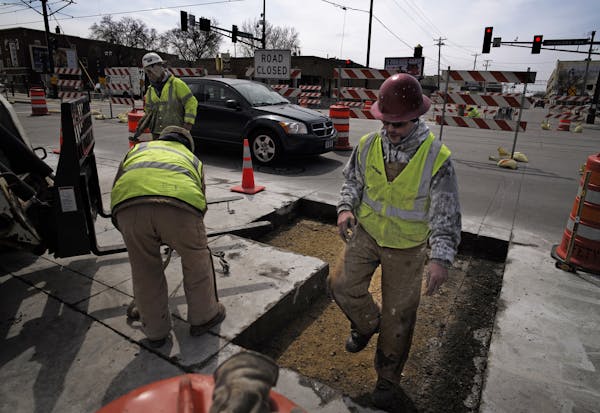Vibrations from traffic crossing light-rail tracks are disrupting recording operations in several of Minnesota Public Radio and American Public Media's state-of-the-art studios, only two months before trains will start running daily past their downtown St. Paul headquarters.
"The floor is vibrating, the ceiling is shaking, the structure is making noise, and that affects the recordings," said Nick Kereakos, chief technology officer and operations vice president for MPR and American Public Media.
MPR and the Metropolitan Council, which oversees Metro Transit, say they're working on a solution to meet the terms of their 2009 mitigation agreement, which requires the agency to keep noise and vibrations within federal guidelines.
Mark Fuhrmann, the Met Council's rail projects director, said he's sure that an answer will be found and that it won't delay the line's June 14 opening. "We're in ongoing conversations with MPR to improve vibrations caused on passing traffic on East 7th Street," he said.
Still, it's another unwelcome road bump for the $957 million project, which earlier this week was forced to rip up and replace new concrete panels at 11 intersections after they were found to be cracked and defective. The cost of that work will be borne by the contractor.
Not so with the vibration problems, which the Met Council will have to cover — just as it did in 2012, when it installed insulated windows at MPR to block out street noise and when it agreed in 2009 to install a $1 million concrete slab over hard rubber pads outside MPR and two adjoining churches on Cedar Street.
Train test runs were fine
A floating slab also was installed on tracks running alongside University of Minnesota research labs, where school officials worried that trains might disrupt sensitive instruments.
The trains themselves have caused little vibration at MPR in recent test runs on the tracks, Fuhrmann said. No excess vibration was detected in October, while tests in January resulted in vibration exceeding standards in a couple studios. "We believe the floating slab track is operating very effectively to moderate any of the vibrations caused by the trains," he said.
But those same tests detected vibrations in MPR's south building that Fuhrmann said came both from vehicles clattering across the light-rail tracks at Cedar and E. 7th as well as nearby vehicles that didn't come in contact with the tracks.
MPR's engineering consultants dispute the Met Council's belief that nearby traffic that doesn't touch the tracks contributes to the vibrations, which they say are purely the result of the project.
The Met Council and MPR haven't made a final decision on what to do, Fuhrmann said. But he said the fix probably will involve modifications either on the street itself or inside the studios to dampen the buzz.
Kereakos said the traffic vibrations have been an issue since February 2013. The studios most affected are those that host musical performances; MPR's on-air broadcast studios are in a different part of the complex and are not affected.
"We're confident that the Met Council will honor the agreement, and we appreciate that Chair [Susan] Haigh has committed to finding a solution," Kereakos said.
Previous concerns
MPR wasn't always so sure.
In 2004, MPR broke ground for a $41 million expansion of its downtown St. Paul headquarters. By then, Cedar Street had been identified as one of three possible downtown routes for a light-rail line.
When Cedar was chosen, MPR began using its airwaves to urge the track be moved. Attorneys asserted that the noise and vibrations "could well shut down the highly sensitive MPR Broadcast Center."
In the end, MPR agreed to work on noise mitigation with the Met Council, which proposed the floating concrete slab on rubber pads. MPR thought a slab positioned on steel springs would be better, if more expensive, and sued. A Ramsey County judge found no evidence that the Met Council had breached the agreement and dismissed the case.
The U also had sued the Met Council over the light-rail route but dropped the suit after signing off on an exacting 40-page agreement that listed specifics on construction, testing and possible remedies.
U spokesman Chuck Tombarge said Thursday that university officials are evaluating testing conducted over several months by the Met Council on vibration and electromagnetic interference issues.
"The U is in discussions with the Metropolitan Council as to the implications of the results," he said.
Kevin Duchschere • 651-925-5035
In heated western Minn. GOP congressional primary, outsiders challenging incumbent

Minnesota Sports Hall of Fame: A class-by-class list of all members

This retired journalist changed professional wrestling from Mankato

